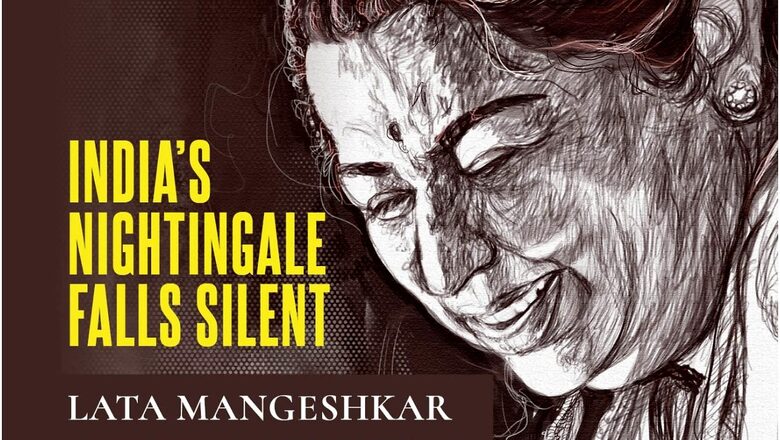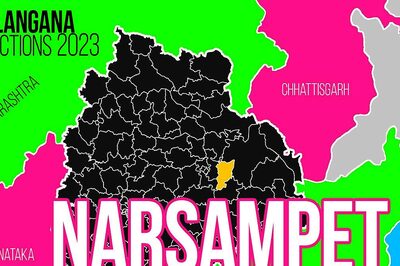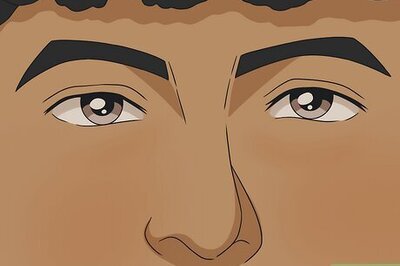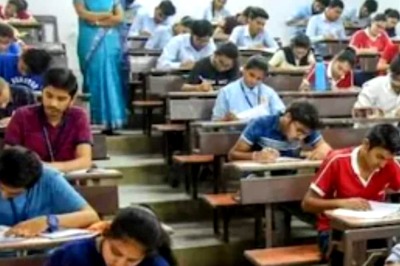
views
Lata Mangeshkar, universally acclaimed as the “Queen of Melody” and one of India’s greatest singers of all time, has passed away, leaving a gaping hole in the Indian music industry. She was 92.
The legendary singer died on February 6 morning in Mumbai due to multiple organ failure after testing positive for Covid 28 days ago. She had tested positive for Covid with mild symptoms and was admitted on January 8 to Breach Candy Hospital’s intensive care unit (ICU).
Mangeshkar was born Hema Mangeshkar in Indore in 1929, and her musical gift was evident early on. She was known to possess one of the most versatile voices in the golden era of Hindi cinema. Although she was soft spoken, very shy and even reclusive — Mangeshkar’s remarkable singing voice had an ability to convey the meaning of a song better than the words could have ever done.
LIVE Updates: Lata Mangeshkar Passes Away at 92; India Mourns Demise of its Nightingale
She made her singing debut at the age of 13 with Marathi film Pahili Mangalaa-gaur. Mangeshkar also appeared in a brief role in the film, produced by Navyug Chitrapat movie company. The company was owned by Mangeshkar’s close family friend, actor-director Vinayak Damodar Karnataki aka Master Vinayak, who served as a guiding light for her own segue into classical music, at around age 16. After Master Vinayak’s demise in 1948, music director Ghulam Haider, who was known for his eye for talent, began mentoring Mangeshkar.
Haider and Mangeshkar had a relationship that surpassed that of the typical singer and music composer. Haider discovered Mangeshkar as a teen, nurtured her and introduced her soulful sound to the world. In an interview on her 84th birthday, Mangeshkar had herself said that Haider played a key role in giving first major breakthrough to her with song Dil Mera Toda, Mujhe Kahin Ka Na Chhora in 1948 film Majboor.
Ever since then, there was no looking back for Mangeshkar. The song, Aayega aana waala from Mahal (1949) cemented Mangeshkar’s position as a playback singer. Soon, she moved into what became the most successful chapter of her career. She went on to work with almost all major music directors like Sachin Dev Burman, Salil Chowdhury, Madan Mohan, Kalyanji-Anandji, Khayyam and Pandit Amarnath HusanLal Bhagat Ram.
Through the 1950s and 60s, she sang in every musical genre, from bhajans like Tumhi ho mata pita tumhi ho and Allah tero naam to dance numbers like Jabse Laagi Tose Najariya and Hoton Pe Aisi Baat, and romantic tunes like Lag Jaa Gale and Ajeeb Dastan Hai Yeh. Her 1963 patriotic track Aye Mere Watan Ke Logo, which was composed to commemorate Indian soldiers died during the Sino-Indian War, still ranks among one of the most iconic songs ever made in the country.
But Mangeshkar’s most memorable classics will always be with Kishore Kumar, her collaborator on all of those incredible late ’60s, ’70s and the 80s megahits. Songs like Kora Kagaz from Aradhana, Tere Bina Zindagi Se from Andhi, Tere Mere Milan Ki from Abhimaan, Aap Ki Ankhon Me Kuch from Ghar, Dekha Ek Khwab from Silsila are just a few examples of their evergreen melodious duets. Mangeshkar teamed up with a few other greats, like Mohammed Rafi, Mukesh, Hemant Kumar and Manna Dey all through the 1960s and 1970s on many successful songs.
Her collaboration with music director duo Laxmikant-Pyarelal yielded what might be considered their best work with Dil Vil Pyar Vyar from Shagird, Sheesha Ho Ya Dil Ho from Asha, Mere Naseeb Mein from Naseeb and Ye Galiyan Ye Chaubara from Prem Rog. The duo considered Mangeshkar instrumental in their success.
In 1974, The Guinness Book of Records featured Mangeshkar as the most recorded artiste in the history, stating that she had reportedly recorded “not less than 25,000 solo, duet and chorus backed songs in 20 Indian languages” between 1948 and 1974. Her record was later challenged by Mohammad Rafi, who claimed to have recorded “28,000 songs in 11 Indian languages between 1944 and April 1980”. However, in the year 2011, Mangeshkar’s younger sister Asha Bhosle was officially acknowledged as the most recorded artiste in music history by the Guinness Book.
In later years, Mangeshkar worked with music composers like Aadesh Shrivastava, Jatin Lalit and AR Rahman. Their collaborations yielded hits such as Kabhi Khushi Kabhie Gham, Mere Khwabon Mein, Luka Chuppi, O Paalanhaare and Oh Sajna Dilbar, among others.
Mangeshkar was in news a few years ago over her reaction on internet sensation Ranu Mondal, whose video of singing the former’s classic Ek Pyaar Ka Nagma hai at the busy Ranaghat station in West Bengal went viral. “I’m happy if someone is getting work by singing my songs. But I feel imitation is not a reliable and durable companion for success,” Mangeshkar had said.
Moreover, Mangeshkar recorded her last song in 2019, titled Saugandh Mujhe is Mitti Ki. It was released on March 30 as a tribute to the Indian Army.
Today, she may not be with us anynmore, but her unparalleled legacy of music will live forever through her soulful renditions.
Read all the Latest Movies News here



















Comments
0 comment